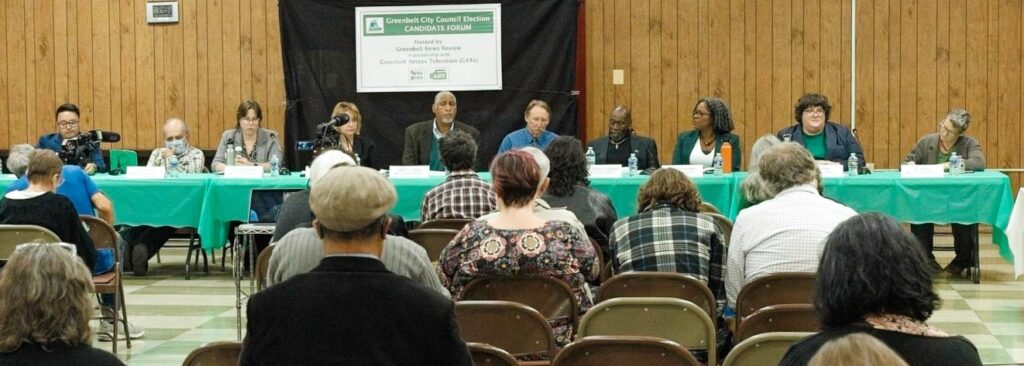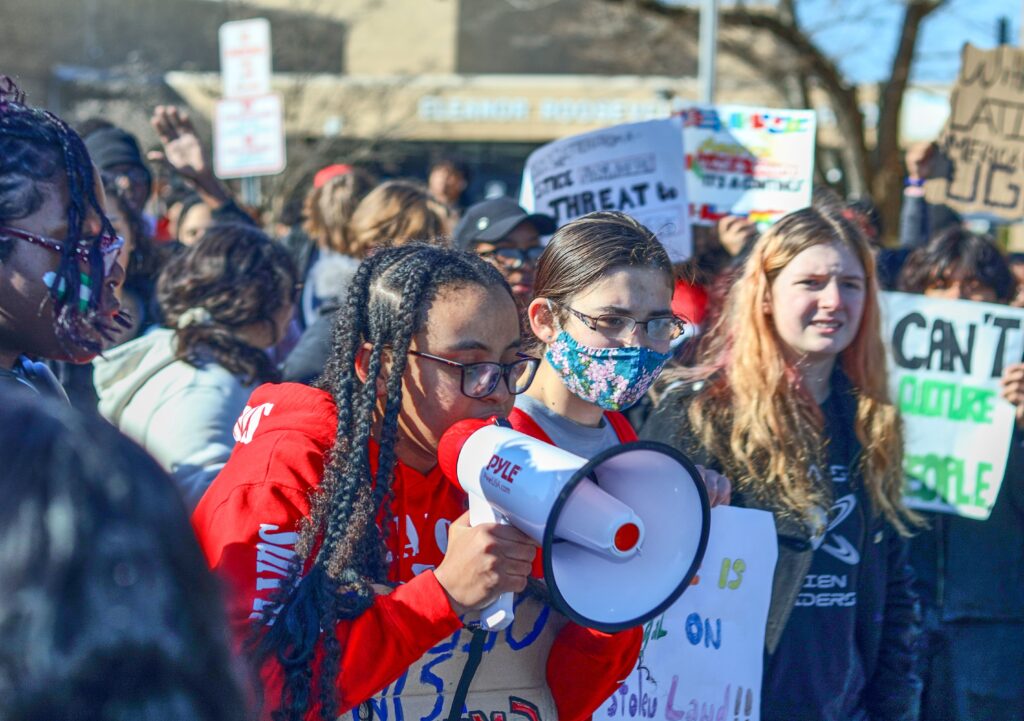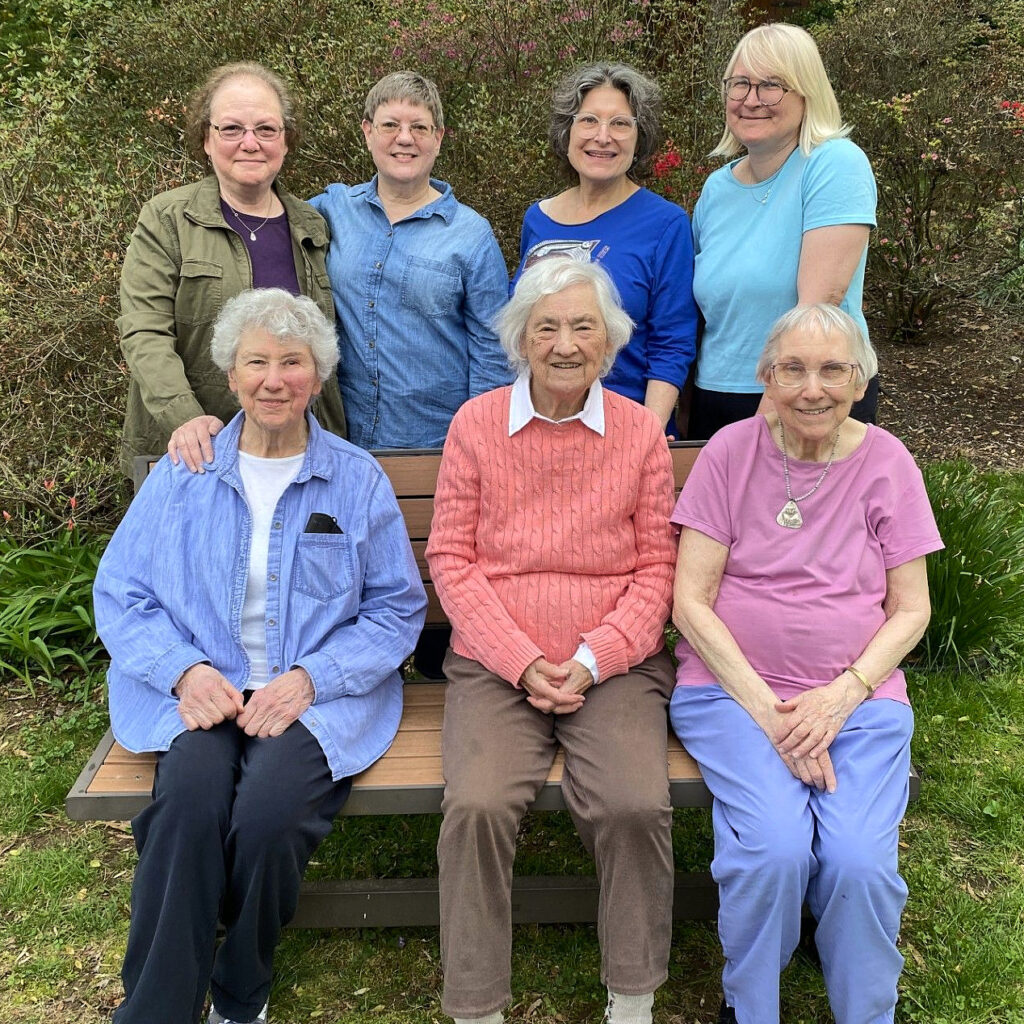All 10 candidates for the seven seats on the Greenbelt City Council appeared at a forum on the evening of Thursday, October 9, to make their views known on a variety of issues facing the city. Hosted by the News Review and Greenbelt Access Television (GATe), and moderated by Dave Zahren, the forum attracted a crowd of about 60 observers to the Firehouse and was livestreamed via Zoom, as well as recorded by GATe.
The candidates faced three rounds of questions from a list of six prepared by the News Review staff, who had solicited community suggestions. In the first two rounds, groups of three or four candidates were asked questions. In the third round, all candidates, in random order, answered a question of their choice that they had not already been asked. Those third-round answers are incorporated into the discussion of each question below.
Question One: Most Important Accomplishment
Frankie Fritz, Amy Knesel and Emmett Jordan were asked what was their most important accomplishment or that of council in the last term. Kristen Weaver, Danielle McKinney and Jenni Pompi also chose to answer this question in the third round.
Fritz cited two accomplishments: implementation of all-resident voting and endorsement of the general order on immigration, noting that barely one in six voters voted in the last municipal election, stressing that everyone needs to be at the table. Fritz praised council for prioritizing protection of immigrants in the face of “a fascist regime.”
Knesel agreed with Fritz on the importance of all-resident voting, stressing that she learned to listen to many voices and that councilmembers can only support the community if they have input from residents.
Jordan found the building of external relationships, and working together were vital. “Greenbelt is not an island,” he said. For example, completing the deal to acquire the armory involved talking to the head of the Maryland National Guard.
Weaver found the single most important accomplishment was the allocation of American Rescue Plan Act (ARPA) funds. Instead of one or two big projects, council sought ideas from the community and applied the skills, knowledge and expertise of the community in creative projects. She mentioned child care and business vouchers, support for reparations, community and the Buddy Attick Master Plan. McKinney echoed Knesel on the importance of new members of council learning the issues and connecting with the community to make informed decisions within a planning framework and seconded Weaver on the disbursement of ARPA funding, including tackling food insecurity. Pompi, who had worked on the ballot initiative for all-resident voting, also found this most important. She also emphasized the standing order that city police have no role in immigration enforcement.
Question Two: Use of the Armory Site
Four candidates were asked how the city should use the armory site and how to pay for that use: Pompi, McKinney, Kevin “Coach K” Lockhart and Silke Pope. Pompi, McKinney and Pope all mentioned that the three concept plans developed with community input each had good elements but none was perfect. They all noted the opportunities of this large, gateway site; perhaps low-income housing in partnership with nonprofit housing organizations, said Pompi. Perhaps partnering with the county and state to be a small business incubator, said McKinney. Maybe a little bit from each concept plan, Pope said.
Lockhart said that for him the armory was a sacred place as he had served there for three years as a member of the National Guard. He would like to see “something for our children,” a place where they could learn how to meet the next stage in life. “Not every kid goes to college,” so perhaps the armory could become a place where they could learn plumbing, other trades or general life skills.

Question Three: The Environment
What municipal actions could be taken to protect the environment, in light of declining federal support, was the third question posed.
Bill Orleans said the city should ally with governmental and nongovernmental organizations advancing climate concerns. He also stated that many private companies remove trash and recycling from the city and thought the city should take it over, to reduce the number of trucks affecting the environment.
Rodney Roberts wants to “Think big and act big” and seek National Park status for Beltsville Agricultural Research Center and the Patuxent Wildlife Refuge, along with any Goddard federal land. It represents enormous green space and important habitat; it’s vital to provide kids access to nature, said Roberts. He would work with groups such as the National Park Trust on this big cause.
Weaver noted steps council is already taking for environmental sustainability, such as the electrification of the city fleet, installation of electrical vehicle charging stations and the efforts to reduce trash with the pay-as-you-throw plan. She would like to see grants for the solarization of city buildings, local air quality monitoring and individual actions that could magnify across the city.
Question Four: Affordability
McKinney, Orleans and Knesel were asked what actions they would propose to increase the nonresidential tax rate and keep Greenbelt affordable. Fritz and Jordan also chose to answer this question. McKinney and Orleans both addressed the commercial tax rate and how the city should work with the state on reducing tax abatements for businesses. Knesel, noting the empty high- rise office buildings once occupied by NASA contractors, argued for motivating developers to make those spaces more attractive as incubator spaces for small businesses and start-up companies that could help provide jobs to residents.
Fritz, combining an answer to this question with questions about the armory site and unemployment, envisions Greenbelt as a cultural powerhouse if the city enhances transportation options for local job access, including better routes and more frequent runs of Green Line trains, WMATA buses, MARC and Amtrak. Development of the armory site as a job incubator would depend on a transportation justice strategy.
Jordan acknowledged the challenging times and said it is crucial for the city to stabilize businesses here and build on our strengths, such as the city’s economic development staff. He mentioned “the medical mile” of health care practices along Hanover Parkway and the possibility of bringing in more.
Question Five: Violent Crime
Weaver, Pompi, Fritz and Jordan were asked what specific actions the city could take to deter violent crime, with Roberts, Lockhart, Pope and Knesel also weighing in on this topic in light of the devastating murders the weekend before. The community policing model earned praise from many, who, at the same time, acknowledged that it is not enough. Ways must be found to reach young people who are at risk, with after-school resources (Weaver); more money for youth and social services (Pompi); more open space funds to build a park in Greenbelt West (Roberts); more patrols, more officers, more funding (Pope) and getting guns out of the hands of kids (Jordan).
Lockhart, who coaches at the Springhill Lake Recreation Center, found this a particularly emotional issue, urging that the police engage more with the community on foot and bike patrols, not just drive-by policing. He suggested a Police Athletic League where officers could serve as mentors and coaches so the kids would learn to trust the police and not fear them.
Fritz and Knesel both talked about the effects of economic disparity and the lack of affordable housing on crimes in Greenbelt’s different neighborhoods. Fritz emphasized racial disparity in neighborhoods and talked about the needs of children as parents work multiple jobs and longer hours to avoid evictions and that social services come only after the harm has been done. Knesel, who noted that she and many members of the community were participating in the HUG WALK when the 14-year-old was shot and killed nearby, said the lack of neighborhood stability with frequent evictions and rental turnovers inhibits community members from looking after each other.
Question Six: Job Loss
The final question, asked of Pope, Lockhart and Roberts and also answered by Orleans, concerned how to support residents who have recently lost their jobs and how to pay for those strategies. All four stressed the need for citizens to take care of each other, particularly in light of the government shutdown and other federal job losses affecting the city. Pope and Orleans focused on food, with city food distribution, the interfaith food pantry and, as Orleans suggested, mutual aid societies hosting meals in the city gym, Springhill Lake Recreation Center and perhaps the Firehouse. Lockhart and Roberts urged all residents to reach out and help each other ‒ if you have a job that needs to be done, hire someone local to do it. People need to help each other, they said.
Closing Statements
In their 90-second closing statements candidates each stressed their key themes.
Pompi said that in these unprecedented times, Greenbelt needs leaders with the moral courage to take stands and get things done, such as the standing order against police enforcement on immigration and commitment to the city’s JEDI (Justice, Equity, Diversity, Inclusion) goals.
Roberts stressed his 34 years of accomplishments on council but noted that it was a result of the people he has worked with over the years on council and in public. He said he had the desire to continue to get things done.
Knesel stated that the community’s strength comes from the connections that are forged. Noting that she was appointed to council after Ric Gordon’s death, she wants to continue his legacy and believes in her ability to meet the challenges the city faces.
Fritz attempted to cover a number of issues, including supporting federal workers, working toward a union for city employees, enhancing transportation to better connect the city and protecting the rights of immigrants and the LGBTQ community. “Your vote is your voice,” he said.
Orleans urged greater voter turnout, but warned, “Your vote is not your voice. Your voice is your voice.” He called on people to vote but also get involved. They should attend city council meetings, said Orleans, noting that, rather than paying the eternal vigilance that is the price of liberty, Greenbelt residents are “not even casually attentive.”
Lockhart, as he had done throughout the night, stressed that “The main thing is the kids, the children.” Greenbelt residents need to work with them and help be part of the solution.
Jordan noted his 15 years of experience on council, helping to block maglev and weather Covid. He said affordability is his number one priority to find ways to keep people in their homes.
Weaver, McKinney and Pope all applauded Greenbelt’s cooperative ethos and spirit of volunteerism. Weaver stressed that she is organized and compassionate and wants to work with council to set policy after feedback from the community. McKinney called herself a facilitator who works to connect the diverse community and find creative and imaginative ways to support them. Pope talked about her long commitment to public safety and neighborhood improvement from the time she lived in Springhill Lake (now Franklin Park).
Interested citizens can watch GATe’s recording of the forum in full at tinyurl.com/2025GreenbeltCandidateForum.



